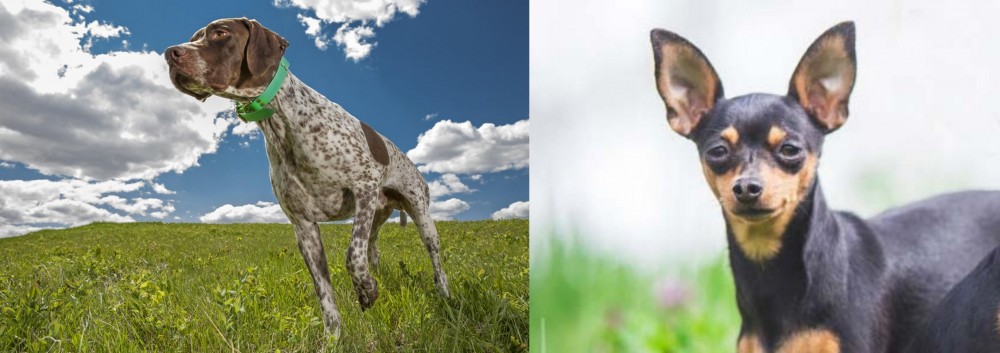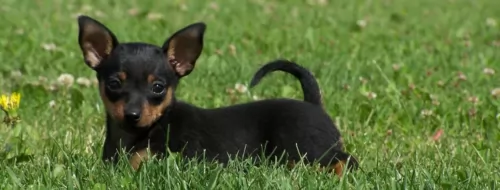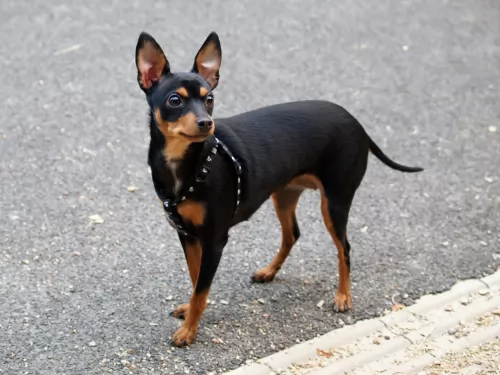 Petzlover
Petzlover Braque Francais (Pyrenean Type) is originated from France but Prazsky Krysarik is originated from Czech Republic. Braque Francais (Pyrenean Type) may grow 35 cm / 14 inches higher than Prazsky Krysarik. Braque Francais (Pyrenean Type) may weigh 51 kg / 113 pounds more than Prazsky Krysarik. Both Braque Francais (Pyrenean Type) and Prazsky Krysarik has almost same life span. Braque Francais (Pyrenean Type) may have more litter size than Prazsky Krysarik. Both Braque Francais (Pyrenean Type) and Prazsky Krysarik requires Low Maintenance.
Braque Francais (Pyrenean Type) is originated from France but Prazsky Krysarik is originated from Czech Republic. Braque Francais (Pyrenean Type) may grow 35 cm / 14 inches higher than Prazsky Krysarik. Braque Francais (Pyrenean Type) may weigh 51 kg / 113 pounds more than Prazsky Krysarik. Both Braque Francais (Pyrenean Type) and Prazsky Krysarik has almost same life span. Braque Francais (Pyrenean Type) may have more litter size than Prazsky Krysarik. Both Braque Francais (Pyrenean Type) and Prazsky Krysarik requires Low Maintenance.
 The Braque Francais Gascognes and the Braque Francais Pyrenees are two alike dogs that are in reality separate breeds. The Pyrenees is not as rare as his larger brother, Gascognes. Around since the 15th century at least, not mush is really known about their origins. Because the Braque Francais was exported or taken to so many different countries in the 15th-18th centuries, a lot of information regarding the origins of the breeds were lost. There was a major study done in the 19th century that showed the two dogs came from very different blood lines. It is known that in this timeframe there was an acute need for a dog that was better than the current hunting breeds. This dog needed to be able to point, track, retrieve and flush.
The Braque Francais Gascognes and the Braque Francais Pyrenees are two alike dogs that are in reality separate breeds. The Pyrenees is not as rare as his larger brother, Gascognes. Around since the 15th century at least, not mush is really known about their origins. Because the Braque Francais was exported or taken to so many different countries in the 15th-18th centuries, a lot of information regarding the origins of the breeds were lost. There was a major study done in the 19th century that showed the two dogs came from very different blood lines. It is known that in this timeframe there was an acute need for a dog that was better than the current hunting breeds. This dog needed to be able to point, track, retrieve and flush.
With no authenticated story of origin, many myths have grown up in the vacuum. The most common belief is that the Chien d’Oysel, an ancient spaniel breed that was medium sized with brown or white fur and brown markings, is an ancestor of the Braque Francais and local hunting dogs. To make the Gascognes larger and stronger than the Pyrenees, local scent hounds were also crossed with these dogs. The Pyrenees does not have these scent hounds in their background.
Until the late 1800’s, there was only one type and one breed of Braque Francais. But when the breed was no longer the dogs of a nobility, the average hunter needed a smaller dog. Urbanization following the French Revolution added to this trend and the Pyrenees Mountain hunters crossed the Gascognes with smaller scent hounds and pointers. Thus, they created the Braque Francais Pyrenees and each dog became its own breed in 1920.
The Braque Francais breed club, including standards for both breeds was established in 1850 with the standards established in 1880. This acceptance was then followed by registration of both breeds in the International Kennel Club (FCI) and the French Kennel Club. Canada recognizes only the Gascoigne and the United Kennel Club (UKC) of the United States, recognized both. Neither breed has been recognized by the American Kennel Club (AKC).
The Second World War was brutal to both types of the Braque Francais, but the Pyrenees have surpassed their sister breed and are the only one that has found its way to North America. The importers have started a breeding program in Canada. Later a few were imported to the States. There are currently at least four breeders in North America – 2 in the U.S. and 2 in Canada. It is thought that there are less than 200 Braque Francais Pyrenees living in North America.
 You won’t find this dog outside the Czech Republic, which is a pity, because as one of the smallest breeds, it’s a great choice for people with small properties.
You won’t find this dog outside the Czech Republic, which is a pity, because as one of the smallest breeds, it’s a great choice for people with small properties.
It’s not a new breed, and there are records of it having been around in the Middle Ages, being valuable for catching rats.
The breed went through a decline in the 1980s, but their breeding program was started, although it isn’t an FCI acknowledged breed.
 The Braque Francais breeds are medium sized dogs with the Pyrenean standing 10 centimeters shorter than the Gascogne. They have a, white or chestnut brown coat with brown spots and a brown head. The Pyrenees has a head that is broader and ears that are not as long as the Gascogne. Their muzzle is narrower. He is strong, tall with hanging lips and square muzzles.
The Braque Francais breeds are medium sized dogs with the Pyrenean standing 10 centimeters shorter than the Gascogne. They have a, white or chestnut brown coat with brown spots and a brown head. The Pyrenees has a head that is broader and ears that are not as long as the Gascogne. Their muzzle is narrower. He is strong, tall with hanging lips and square muzzles.
 The Pražský Krysařík is a small dog standing at between 20 and 23cm in height and weighing between 1.5 and 4kg.
The Pražský Krysařík is a small dog standing at between 20 and 23cm in height and weighing between 1.5 and 4kg.
The Prazsky Krysarik may be small, but he is robust with a broad chest and a lean body with a fragile, lizard like head, much like a Chihuahua. The legs are fragile and thin. The ears are fairly large and erect and he has a long tail. The coat is short, thin and glossy and is mostly black and tan.
The Prazsky is known for its playful, lively nature, and they’re spunky and intelligent dogs too and will be more than capable of being trained and socialized.
Even though he is such a tiny dog, it will be to his benefit to have him trained and socialized.It makes the dog well balanced and they become well behaved so you can take them anywhere.
They are such friendly, social little dogs too and they love being around their human family. They certainly don’t like being left in the backyard, cut off from their human companions.
They're small enough to be indoors a lot, being able to easily slot into life in the city or in the countryside. They get on well with children and other pets but kids will have to be taught how to treat him with kindness and respect, as those tiny little legs could snap.
 This is a sociable, lovable, friendly breed. They are gentle and docile dogs that want only to please you. They like children as well as adults and will never be a guard dog as they are friendly to strangers as well. The Braque Francais Pyrenees is affectionate while being highly skilled hunters. They are prone to severe separation anxiety if left alone for long. They might even have a tendency toward shyness.
This is a sociable, lovable, friendly breed. They are gentle and docile dogs that want only to please you. They like children as well as adults and will never be a guard dog as they are friendly to strangers as well. The Braque Francais Pyrenees is affectionate while being highly skilled hunters. They are prone to severe separation anxiety if left alone for long. They might even have a tendency toward shyness.
 A Prazsky is a dog just like any other – he just wants to be a member of the family. He badly wants the love and attention of his human family but he wants to give love and attention in return too.
A Prazsky is a dog just like any other – he just wants to be a member of the family. He badly wants the love and attention of his human family but he wants to give love and attention in return too.
They make wonderful pets and he is more than willing to put aside playing outdoors to come inside and just be by your side.
These little dogs are a great choice for those looking for a small-sized dog. They’re such friendly, responsive little dogs and they don’t come with many health-related issues. The Prague Ratter adapts well to city or country living and he is prepared to be loyal and loving wherever you take him.
 The breed of Braque Francais in both its incarnations is generally a pretty healthy dog. They are prone to several issues including dysplasia of the elbow and hip, aortic stenosis, some eye issues and patellar luxation. The eye issues are around the lids and include ectropion and entropion along with cataracts and progressive retinal atrophy (PRA). These issues are not avoidable, but the risk can be reduced even more by breeder testing of parents of any litter and then test the litter. Both the OFA and CERF should conduct tests for the dysplasia (Orthopedic Foundation for Animals) and eyes (Canine Eye Registration Foundation).
The breed of Braque Francais in both its incarnations is generally a pretty healthy dog. They are prone to several issues including dysplasia of the elbow and hip, aortic stenosis, some eye issues and patellar luxation. The eye issues are around the lids and include ectropion and entropion along with cataracts and progressive retinal atrophy (PRA). These issues are not avoidable, but the risk can be reduced even more by breeder testing of parents of any litter and then test the litter. Both the OFA and CERF should conduct tests for the dysplasia (Orthopedic Foundation for Animals) and eyes (Canine Eye Registration Foundation).
 The Prazsky is a robust dog but there are some diseases that can affect a dog, and skin symptoms such as itchiness or an unusual lump will need to be seen to.
The Prazsky is a robust dog but there are some diseases that can affect a dog, and skin symptoms such as itchiness or an unusual lump will need to be seen to.
Other problems such as excessive drooling, cloudy eyes with discharge, distended abdomen and discolored gums are all reasons to seek the help of your vet. Small dogs like this tend to be prone to dental disease, so keep an eye on his teeth.
Some people look at buying health insurance because they know too well that veterinary costs can add up quickly, even for a tiny little dog like this.
 This breed need a high energy food including raw meat such as chicken, fish, and beef. If feeding kibble, they need about 2.5 cups per day.
This breed need a high energy food including raw meat such as chicken, fish, and beef. If feeding kibble, they need about 2.5 cups per day.
Prone to inflammation and infections of the ears as they are long and floppy. Clean them regularly. As previously mention eye disorders, joint dysplasia and bloat.
The Braque Francais Pyrenees is a fairly versatile hunting dog. They can hunt on all types of terrain by trailing, flushing and retrieving. They are quick and move quickly without actually sprinting. This dog needs serious exercise every day. They will walk or jog with you. They will run along side your bike. Whatever you choose to do, do it for an hour a day. Don’t make couch potatoes out of this breed. It will not turn out well if you do. They need a place where they can play off leash as well, such as a large yard or a dog park.
 It doesn’t matter what size dog you have, each one requires high quality dog food, whether commercially manufactured or home-prepared.
It doesn’t matter what size dog you have, each one requires high quality dog food, whether commercially manufactured or home-prepared.
Portion sizes should be appropriate to your dog’s size and activity levels. Dogs thrive on simplicity when it comes to food as this prevents them having digestive problems. Boiled chicken, brown rice or pasta and sweet potatoes, spinach and carrots all chopped up and added to your dog’ dry kibble as a treat every now and again will do wonders for your pet.
Fresh, cool water should always be available to your pet around the clock.
The short, smooth coat of the Pražský Krysařík makes him a truly low maintenance little dog. Just give him a brush twice a week and wipe him down with a damp cloth and he’ll always be gleaming like a new penny.
Have his nails trimmed and always check his teeth during these grooming sessions. Smalls dogs battle with dental disease, and this can cause havoc in the body of your small pet.
Walk your tiny pet at least once a day. It just gives him the chance to sniff around a bit and see the world in a new light. He doesn’t require a lot of physical activity, but they will still need regular exercise to stave off obesity.
Get your Pražský Krysařík spayed or neutered if you’re not intending to allow your pet to have puppies. These little dogs can have between 1 – 3 puppies. There are many pros to this procedure for dogs.
Make sure his vaccinations are up to date to avoid some of the deadly dog diseases you get such as parvo-virus, distemper and rabies.